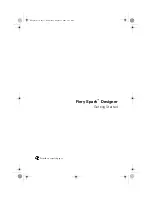
NI Spectral Measurements Toolkit User Guide
6
ni.com
2.
Enter the output power spectrum into an SMT measurement VI
and/or use the SMT Spectrum Unit Conversion VI as follows:
a.
Enter the output power spectrum into an SMT measurement VI:
the SMT Power in Band, the SMT Adjacent Channel Power, or the
SMT Occupied Bandwidth VI. These VIs accept a power
spectrum with units V
2
rms
and return the requested measurements.
Perform the measurements on only an unscaled power spectrum.
You can specify the units in which to view these measurements.
b.
Use the SMT Spectrum Unit Conversion VI to display the power
spectrum in units other than the default, V
2
rms
. The VI allows you
to convert the raw data into the following units: watts, volts, or
variations of dB such as dBm, dBW, and dBV. You can specify
different scaling factors such as RMS or peak.
3.
Use the SMT Spectrum Peak Search VI to find specific tones or
peaks in the spectrum. The SMT Spectrum Peak Search VI accepts
only a unit-converted power spectrum. You must specify the threshold
level in the same units as the power spectrum. The VI detects any peak
above the threshold level as a valid peak.
Advanced-Level VIs
The zoom processing capability of the SMT Basic Zoom Power
Spectrum VI is limited by the size of the data previously acquired. Use
the VIs located on the
SMT Advanced
palette to control zoom settings or
additional settings such as window type, RBW, number of spectral lines,
and RBW definition.
Complete the following steps when using the advanced-level VIs of the
programming flow diagram in the SMT Programming Flow VI:
1.
Use the SMT Config Zoom FFT VI to configure the zoom settings. Use
the default values for the spectrum settings control if you are unsure
of the settings. The VI uses the values you enter to recommend an
acquisition size or a data size. The VI also maps measurement-specific
settings to classical analysis settings.
2.
Enter a time-domain signal of the size recommended by the SMT
Config Zoom FFT VI into the SMT Zoom Power Spectrum VI.
You must pass the
SMT zoom settings
parameter from the SMT
Config Zoom FFT VI to subsequent VIs to ensure accurate data. The
SMT Zoom Power Spectrum VI performs zoom FFT processing and
returns a power spectrum with units V
2
rms
.
3.
Enter the output power spectrum into subsequent measurement VIs
using the guidelines in steps 2 and 3 of the
section.







































